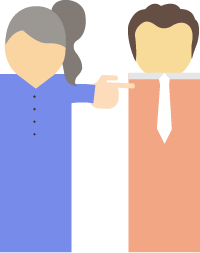Wednesday 17 May 2023 Article
The TakeawayA First-time Manager's Playbook for Dealing with Conflict in the Workplace
How to Overcome the Trials and Tribulations of First-time Management
Part 3
#FirstTimeManager #NewManager #TeamConflict #ReasonsForConflict #NewManagerTrainingCourses #ManagementTrainingForNewManagers #ChallengingConversations
The perfectly matched resource for this article...
[Playbook] Download Our New Manager's Playbook for Dealing with Conflict Here!
This quick playbook is designed to support new managers in dealing with workplace conflict which can be a daunting task for first time managers.
Download!Playing catchup?
A First-time Manager's Playbook for Dealing with Conflict in the Workplace
Becoming a manager for the first time brings a range of responsibilities, including effectively managing conflicts in the workplace. Conflict is a natural occurrence in any organisation and how it is addressed can significantly impact team dynamics and productivity. As a new manager, it is crucial to develop the skills and strategies necessary to navigate conflicts and promote a harmonious work environment. In this article, we will explore a practical guide that will help first-time managers effectively address and resolve conflicts within their teams.
Understanding the Nature of Conflict
Conflicts can arise from various sources, such as differences in opinions, personality clashes, or competition for resources. As a first-time manager, it is essential to recognise that conflict is not inherently negative but rather an opportunity for growth and resolution. Understanding the root causes and underlying emotions behind conflicts can help you approach them with empathy and objectivity.

Promoting Open Communication
One of the key aspects of managing conflict is fostering an environment of open communication. Encourage your team members to express their concerns and perspectives freely. Actively listen to their viewpoints, allowing them to feel heard and understood. Establishing regular channels for feedback and encouraging constructive dialogue can prevent conflicts from escalating and foster a culture of trust and collaboration.
Addressing Conflict Proactively
Rather than letting conflicts fester, address them proactively. As a first-time manager, be vigilant and observant of potential conflicts within your team and look out for signs of tension or dissatisfaction and intervene early. It can be a good idea to schedule one-on-one meetings with individuals involved to understand their concerns and perspectives. By taking swift action, you can prevent conflicts from escalating and mitigate their impact on team morale.
Adopting a Mediation Approach
When conflicts do arise, adopt a mediation approach to facilitate resolution. Act as a neutral party and encourage all involved individuals to express their viewpoints without interruption. Help them identify common ground and find mutually agreeable solutions, and encourage compromise and focus on the interests and goals of the team rather than individual agendas. By fostering a collaborative environment, you can promote understanding and reach resolutions that satisfy all parties involved.

Building Emotional Intelligence
Emotional intelligence is a vital skill for first-time managers when managing conflict. Developing self-awareness, empathy, and emotional regulation enables you to navigate conflicts with composure and empathy. You should aim to recognise and manage your own emotions, as they can influence how conflicts are approached. Additionally, showing empathy towards the emotions of others involved in the conflict helps build an atmosphere of understanding and respect.
Seeking Guidance and Support
Managing conflict as a first-time manager can be challenging, and seeking guidance and support is crucial. Reach out to experienced managers or mentors who can provide insights and advice based on their own experiences. Additionally, consider professional development opportunities, such as conflict resolution workshops or courses, to enhance your skills in managing workplace conflicts. Learning from others and investing in your own growth will equip you with valuable tools to handle conflicts effectively.
Conclusion
As a first-time manager, your ability to manage conflicts in the workplace is essential for fostering a productive and harmonious team environment. By following the above guidance, you can navigate conflicts confidently and effectively.
[Playbook] Download Our New Manager's Playbook for Dealing with Conflict Here!
This quick playbook is designed to support new managers in dealing with workplace conflict which can be a daunting task for first time managers.
Download!Missed an article?
More from How to Overcome the Trials and Tribulations of First-time Management
